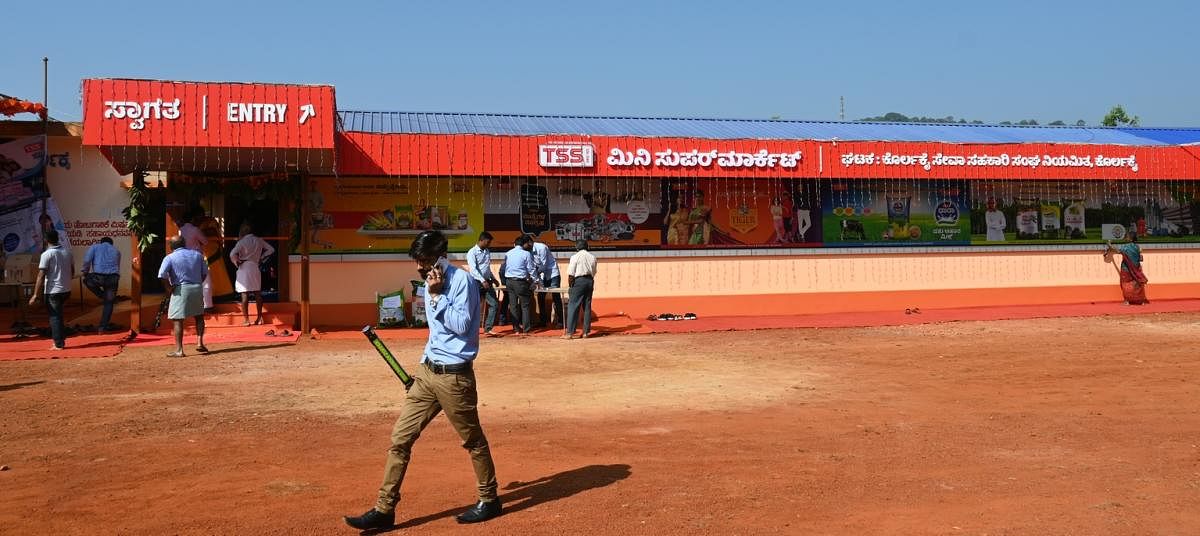
There was a time when cooperative societies in rural areas were completely dependent on farmers’ produce, for their resources and financing. Now, cooperatives are able to support farmers by establishing supermarkets in villages and supplying a variety of provisions.
In Uttara Kannada, village supermarkets have come as a gamechanger for farmers and cooperatives. In Sirsi, Yellapur, Siddapura, Mundgod and Haliyal taluks alone, there are around 22 supermarkets, owned and maintained by various cooperative societies. They sell everything, from groceries, home appliances, plastics, steel utensils, gold and silver ornaments, to construction materials, apparel, footwear and even agricultural machines. The annual turnover of these supermarkets is around Rs 500 crore in total.
For villagers, the availability of all their requirements under one roof has made their lives easy. This concept has saved their time and expenditures, over the past ten years. “Before such supermarkets were in our villages, we had to go to many different shops to buy household items,” says Mahabaleshwara V Bhat Kodemane, a resident of Sirsi who shops regularly at the local cooperative supermarket.
Having noticed a high demand for different kinds of materials, cooperatives began to step in and fill the gap. “People need many materials every day. Instead of any outsider businessman investing crores here, our cooperative societies started opening stores,” says Ramakrishna Kadave, the president of Totagars Cooperative Sale Society (TSS), Sirsi.
TSS opened its first supermarket in Sirsi in 2011. Now, there are two branches in the town. There are also TSS stores in Siddapura, Mundgod and Yellapur, which also make a high annual turnover. In addition, the cooperative has opened a mini supermarket in Hulekal, in collaboration with the Hulekal cooperative society. “Apart from these, we have established our presence in rural areas like Salkani, Dasanakoppa, Korlakatta, Korlakai and Nisrani in the neighbouring Shivamogga’s Soraba taluk, as well as Hoggodu in Sagara taluk,” adds Kadave.
TSS currently has 45,000 members, all farmers. Apart from that, the organisation has a customer base of more than a lakh from Sirsi taluk alone. This number may cross two lakhs, when accounting for customers from other taluks.
The members of the cooperative society reap the benefits of a growing customer base. “Now our members’ spendings will be circulated within the locality, and will finally reach and benefit locals through dividends,” Kadave explains.
A 2.5% rebate is also given to regular customers. “The agriculture and ration units of TSS have had a Rs 275 crore turnover in 2021,” he says.
The success of earlier super markets have inspired many others to follow this idea. We can find supermarkets and mini supermarkets even in villages where the population is about three to five thousand.
Hulagola cooperative society in Sirsi taluk, for instance, has begun helping farmers by supplying all types of agricultural materials. Societies in Vanalli, Sonda, Hegdekatta too, have success stories in this area. The Mundaganamane society has supermarket branches in Devanahalli and Benagao villages, which are 40 km away from the nearest town, Sirsi. The Taluk Marketing Society has also entered the Sirsi market last year.
Another major player in the rural supermarket field is the Kadamba Cooperative Marketing Society, which has a supermarket in Sirsi. They are more focused on organic products.
“Kadamba society has 1,200 shareholders. More than 5,000 of our members are agricultural product sellers. In the last financial year, our turnover from arecanut alone was about Rs 48 crore. And we make Rs 25 lakh per month from business in our supermarket section,” says Vishweshwara Bhat, a marketing consultant for Kadamba Marketing Cooperative Society. He is also the president of Uttara Kannada Organics Federation, a group also doing business on similar lines.
Bhat explains that cooperative businesses are founded on good faith. “We (cooperative societies) are able to build and maintain trust among the general public, especially our members. This has made a huge impact over the decade,” he says.
The increase of supermarkets in rural areas has also had a positive impact on ‘shopping culture’. Bhat notes, “Many people who hail from these villages but currently live in cities like Bengaluru buy rations and food products from here, before returning to cities.”
As for how these ventures can continue developing, Bhat highlights the need for more infrastructure. “We need more cold storage facilities to keep food grains fresh. This can be organised by the Agricultural Produce Market Committee,” he says.
Such developments are welcome, according to farmers, the primary members of cooperative societies. “The support of cooperative societies is not limited to just agricultural activities. They are becoming a backbone of the daily business of villagers. This has had a positive impact indeed,” says Anantha S Bhat, a member of the Hulagola Cooperative Society.
